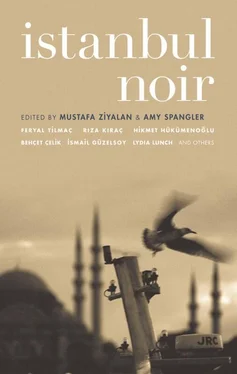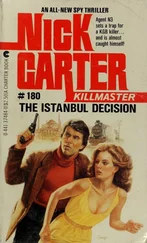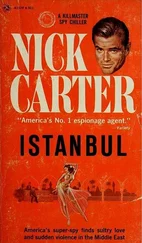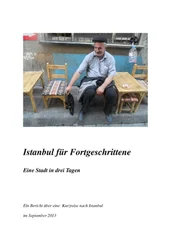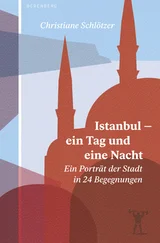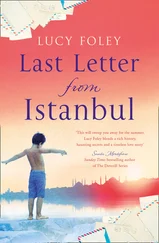There, facing my parents’ murderer, it wasn’t only anger that I felt; I felt sorry for him too. It was a strange feeling.
“Yorgo,” I said. “I’m Yorgo’s son.”
He had heard that voice, my voice, in which he saw his own death, in all its nakedness. The look in his eyes changed. His face transformed, and on it I could see the faint remains of the others’ now invisible, lost faces. I will never forget those eyes, the expression on his pale face. We were all, I imagine, thinking of death at that point. The most impatient of us was Cevat Bey. He was staring at me, silently. There was an odd respectfulness in his gaze, tinged with fear and sadness; you could almost inhale it.
I felt the rope in my pocket. At first, I was encouraged by the sense that my sadness was shared by Cevat Bey. But then this feeling dissipated and Cevat excused himself to the bathroom.
My parents’ murderer and I were listening to the sound of barking from the street. It was neither close nor aggressive.
“I like this barking sound,” he said. “It has a generous, tolerant ring to it.”
His neck was stiff when he spoke, however, and he was staring at the window with an unnecessary focus of attention. On a wooden table lay his glasses, medicine bottles, and a book. At that moment, he seemed to me such a miserable character, a second-rate hit man who had squandered his life away. The way he stood there so still and kept looking out the window, apparently lost in thought, all the nonsense he was talking, it seemed like it would go on and on until his fear had finally ceased. What he was saying was irrelevant, because what was about to happen would erase it all.
I didn’t say anything.
He continued: “I’m going to make something to eat. Would you help me?”
I wasn’t at all surprised. The fact is, people don’t really seek answers to all their questions. I followed him to the kitchen. It had a small window, which was halfway open. There were some plates lying facedown and a knife with a wooden handle on the marble counter. It was an unsettling image, the only things missing were the body of a murder victim and blood on the small, dirty rug.
I gripped the rope in my pocket. I was getting ready to strangle him, but then in a mad rage I grabbed the knife instead. The man stared into my eyes. He was petrified, his face was ashen, he couldn’t move. He struggled to stand. With his arms he held me in a tight hug. His fear was ferocious. The kitchen reeked of sweat.
That’s exactly how it happened. I heard the knife plunge into him and the moans escaping his mouth, which I had covered with my hand. Everything happened very slowly, yet it was over all at once. The act of killing induced a feeling of power, and nausea.
There is only one thing to do in situations like this. It is hard to pull off, but has undeniable advantages: You have to get out of there without leaving any clues behind. But how can one possibly undo what he has done?
Then Cevat Bey, hulking at the door, said in a cautious tone: “Keep the knife, leave the kitchen, I’ll take care of the rest.” He may have been grieved by this state of affairs, but he looked calm.
I didn’t leave the Pera Palace Hotel for two days. Perhaps the guy was actually innocent. I hadn’t even considered this. Perhaps, but my situation at that point kept me from considering such a possibility at length. I was anxiously awaiting Cevat Bey’s phone call. I had to know what was going on. Whether or not I’d be able to return to Fener or even stay in Istanbul depended on the news he was to deliver. The nostalgia I had felt for the city for all those years had morphed into something monstrous. What was I supposed to do now? That was the question.
On the third day, Cevat Bey and I met. We were walking along the shore and darkness was about to engulf Istanbul. The way he put it, everything was okay. His words weren’t burdened by shame or regret; in fact, they seemed almost poetic.
As the city gradually grew emptier, amplifying the background din, Cevat Bey grew silent and withdrawn. Then, perhaps to quell his own uneasiness, he suggested we go to a meyhane. I agreed and we went to the place where we had first met. For some time we successfully skirted the incident that continued to fan my fears. But then, late into night, he said something peculiar: “Destiny made me do it again.” I was aware that there was still a lot that I didn’t know, but my fear was getting the best of me. I couldn’t ask. I just couldn’t. I had already decided to return to Greece, yet at the same time I felt I didn’t have the right, being as close to unveiling the truth as I sensed I was. It wasn’t easy; my memories were drenched in blood, and I was drowning.
As the night wore on, the supposed friend sitting across from me became a dark stain, his lips sealed, often covering his face with his hands. At one point I noticed he was breathing heavily and swallowing hard. When he removed his hands, I was unsettled by the glimmering trail that ran down his cheek and onto his lip — the path of a tear.
“What’s wrong?” I asked.
He obviously needed to get something out of his system. Then, finally, he mentioned a connection with an organization. He had been in jail for a while in his youth. His brother had been killed. He choked up while telling me about those dark days. I searched his gestures, his behavior, for signs that might shed some light, but all I saw was death, and the fear thereof. It wasn’t only his brother who had him so distraught; tears continued to well up in his eyes.
“I can’t get that night out of my mind,” he said.
“What night?” I asked.
He looked at me with sorrowful yet determined eyes, then he told me, the words falling slowly from his mouth: “The night the decision was made to kill your father.”
At first, I didn’t want to believe him. If I was going to hear the truth, it had to be the whole truth; I asked him to tell me everything.
“The three of us were members of the same organization, your father, Kenan, and me,” he said. He continued to drink as he talked. “Your father didn’t like what the organization was up to, for a lot of reasons, and so he split. That was betrayal, and the punishment for betrayal was death.”
I asked as nonchalantly as I could, “What kind of an organization was it?”
He hung his head, then called the waiter and ordered another drink. He seemed to want the rakı, which had already numbed his body, to rub him out for good, obliterate his very existence once and for all. His eyes were damp and bloodshot and he began mumbling. His face was covered with deep lines, like the threads of a spider web. He was trying to console himself with the din of his own words, but I couldn’t make out what he was saying.
Then he went silent.
“Is that it?” I asked.
“No,” he said. “Organizations, politics, you know... The hard part, once you’ve made all the pieces fit together, the hard part is really grasping what it is you’re fighting for.”
The past was consumed by an unquestionable void. But no, it wasn’t empty; whatever was there was definite and intimidating. Cevat Bey took another sip of his rakı and leaned back. He thought I’d understood everything, from his eyes I gleaned that much, but I hadn’t understood a thing. For a moment, I thought it would be a friendly gesture to take him home and tuck him in, but my curiosity got the best of me. “So who ordered my father’s murder?” I asked.
He leaned against the table and drained his glass in one gulp.
“I did,” he said.
His eyelashes weren’t moving, he wasn’t breathing. It was dreadful. An amorphous, indescribable moment. Then he stood up, calmly; he was no longer crying.
“Vasili, my son,” he said. “Let’s take a walk in Fener. You can take me wherever you want.”
Читать дальше
